Unit 3 Teenage problems 单元练习课件(共109张PPT)
文档属性
| 名称 | Unit 3 Teenage problems 单元练习课件(共109张PPT) |
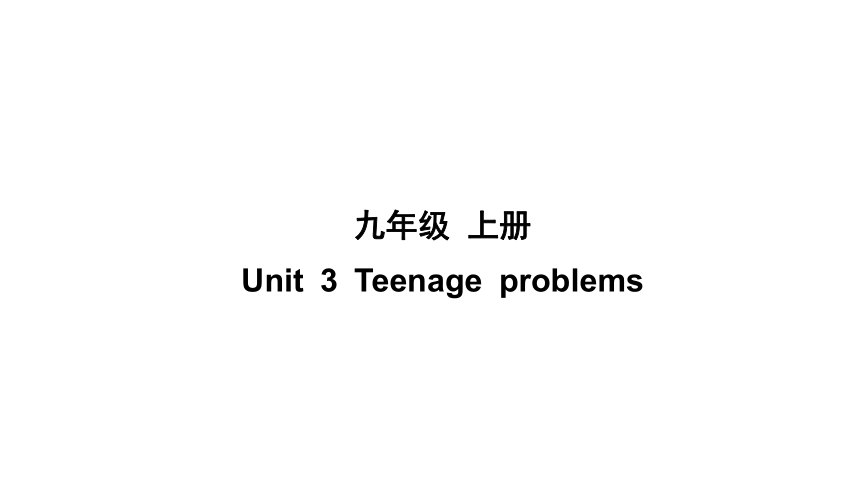
|
|
| 格式 | pptx | ||
| 文件大小 | 781.6KB | ||
| 资源类型 | 教案 | ||
| 版本资源 | 牛津译林版 | ||
| 科目 | 英语 | ||
| 更新时间 | 2024-05-17 22:20:48 | ||
图片预览


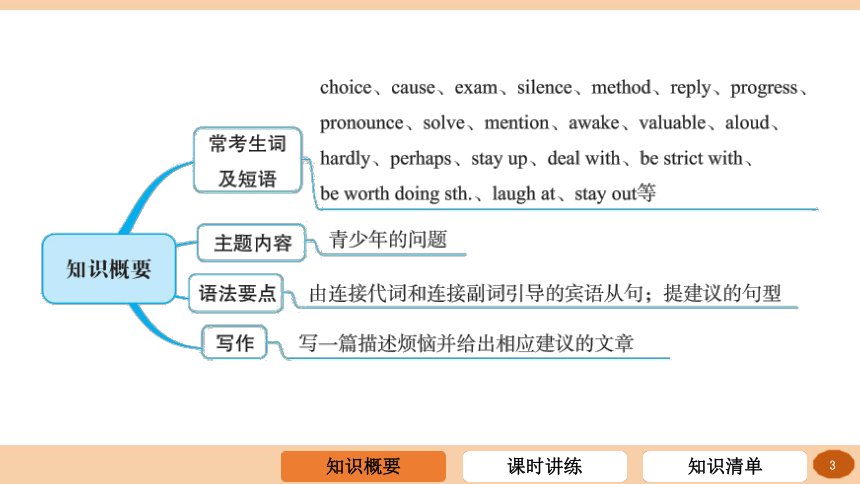

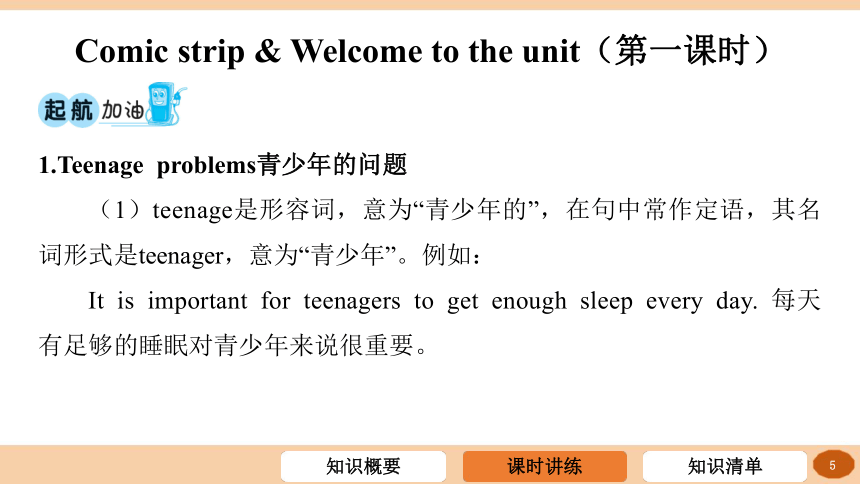
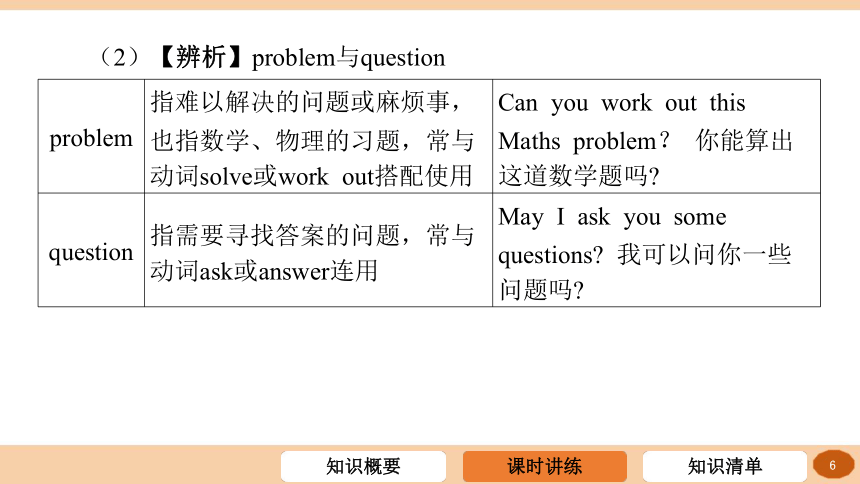
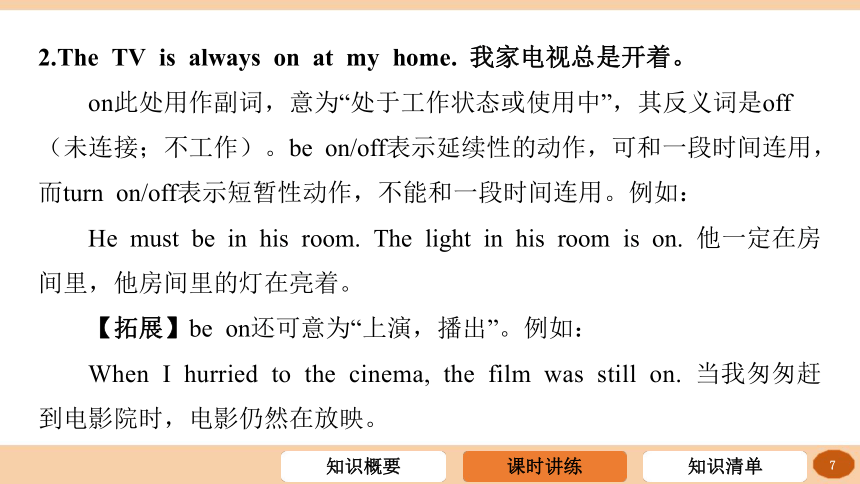
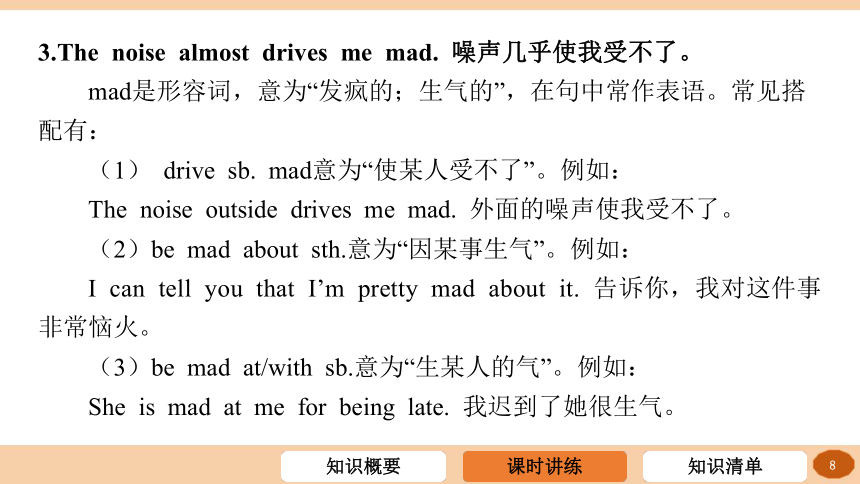
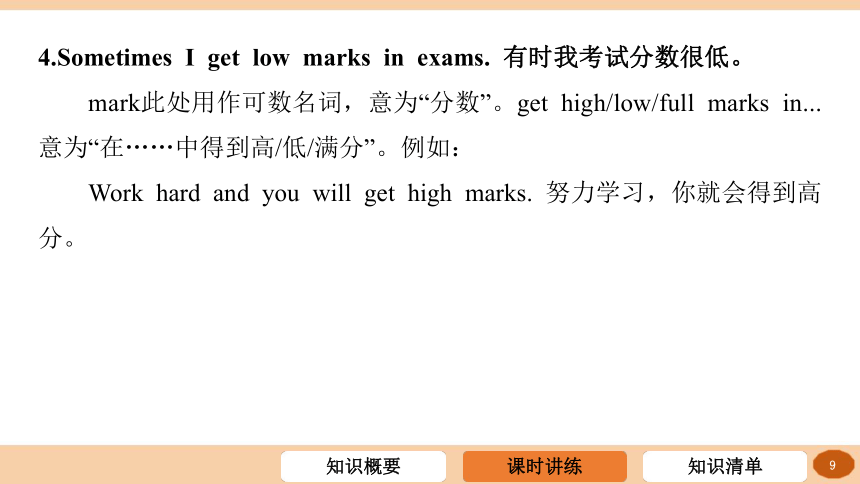
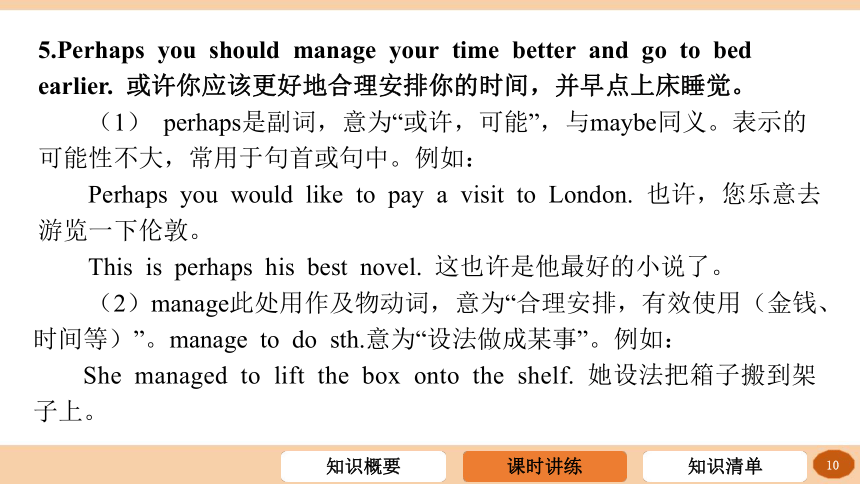
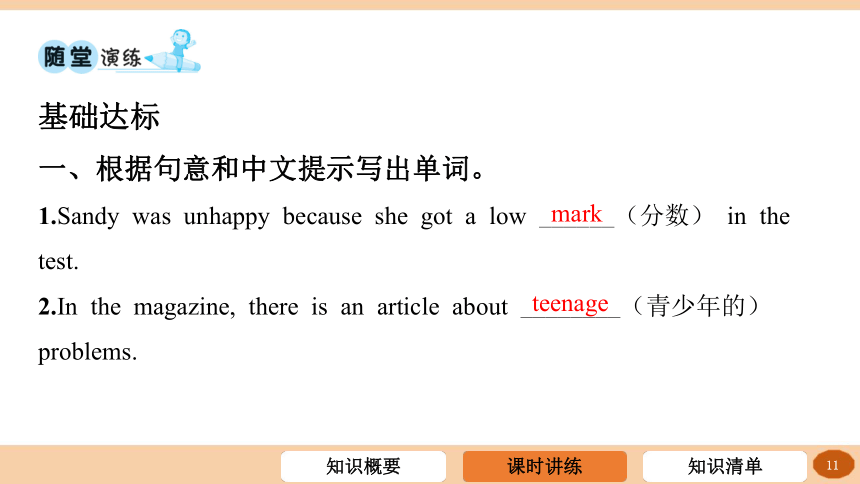
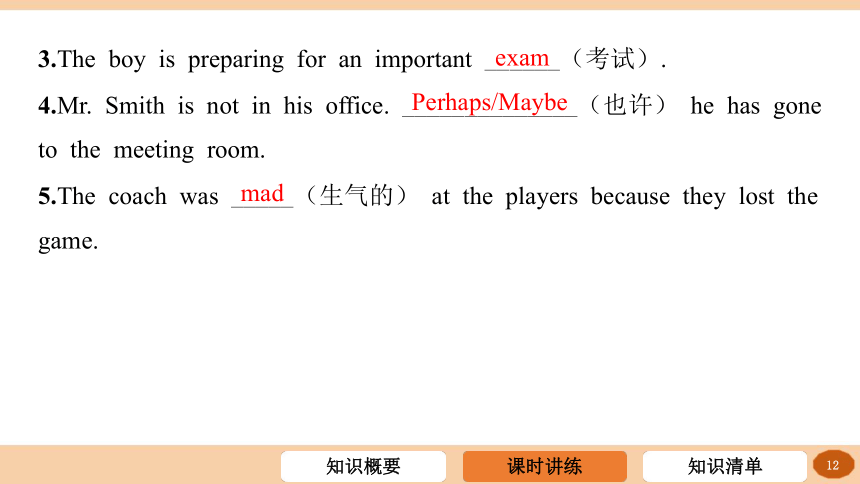
文档简介
(共109张PPT)
九年级 上册
Unit 3 Teenage problems
知识概要
课时讲练
1.Teenage problems青少年的问题
(1)teenage是形容词,意为“青少年的”,在句中常作定语,其名词形式是teenager,意为“青少年”。例如:
It is important for teenagers to get enough sleep every day. 每天有足够的睡眠对青少年来说很重要。
Comic strip & Welcome to the unit(第一课时)
(2)【辨析】problem与question
problem 指难以解决的问题或麻烦事, 也指数学、物理的习题,常与 动词solve或work out搭配使用 Can you work out this
Maths problem? 你能算出
这道数学题吗
question 指需要寻找答案的问题,常与 动词ask或answer连用 May I ask you some
questions 我可以问你一些
问题吗
2.The TV is always on at my home. 我家电视总是开着。
on此处用作副词,意为“处于工作状态或使用中”,其反义词是off(未连接;不工作)。be on/off表示延续性的动作,可和一段时间连用,而turn on/off表示短暂性动作,不能和一段时间连用。例如:
He must be in his room. The light in his room is on. 他一定在房间里,他房间里的灯在亮着。
【拓展】be on还可意为“上演,播出”。例如:
When I hurried to the cinema, the film was still on. 当我匆匆赶到电影院时,电影仍然在放映。
3.The noise almost drives me mad. 噪声几乎使我受不了。
mad是形容词,意为“发疯的;生气的”,在句中常作表语。常见搭配有:
(1) drive sb. mad意为“使某人受不了”。例如:
The noise outside drives me mad. 外面的噪声使我受不了。
(2)be mad about sth.意为“因某事生气”。例如:
I can tell you that I’m pretty mad about it. 告诉你,我对这件事非常恼火。
(3)be mad at/with sb.意为“生某人的气”。例如:
She is mad at me for being late. 我迟到了她很生气。
4.Sometimes I get low marks in exams. 有时我考试分数很低。
mark此处用作可数名词,意为“分数”。get high/low/full marks in...意为“在……中得到高/低/满分”。例如:
Work hard and you will get high marks. 努力学习,你就会得到高分。
5.Perhaps you should manage your time better and go to bed earlier. 或许你应该更好地合理安排你的时间,并早点上床睡觉。
(1) perhaps是副词,意为“或许,可能”,与maybe同义。表示的可能性不大,常用于句首或句中。例如:
Perhaps you would like to pay a visit to London. 也许,您乐意去游览一下伦敦。
This is perhaps his best novel. 这也许是他最好的小说了。
(2)manage此处用作及物动词,意为“合理安排,有效使用(金钱、时间等)”。manage to do sth.意为“设法做成某事”。例如:
She managed to lift the box onto the shelf. 她设法把箱子搬到架子上。
基础达标
一、根据句意和中文提示写出单词。
1.Sandy was unhappy because she got a low ______(分数) in the
test.
mark
2.In the magazine, there is an article about ________(青少年的)
problems.
teenage
3.The boy is preparing for an important ______(考试).
exam
4.Mr. Smith is not in his office. ______________(也许) he has gone
to the meeting room.
Perhaps/Maybe
5.The coach was _____(生气的) at the players because they lost the
game.
mad
二、从方框中选择适当的单词或短语,并用其正确形式填空。
stomach why not sleep have time for little
1.I couldn’t sleep well last night, so I feel _______ in class now.
sleepy
2.Andy, you should eat _____ and exercise more to keep healthy.
less
3.The hungry sheep ran to the field. They couldn’t wait to fill their
_________.
stomachs
4.—My homework is to do a dish for the family. What should I do
—_________ ask Aunt Susan for help She’s a wonderful cook.
Why not
5.—Sorry, Emma. Your father and I won’t _____________ you this
weekend.
—Don’t worry, Mum. I can visit my grandma and spend the weekend
with her.
have time for
stomach why not sleep have time for little
三、单项选择。
1.—Is there anyone in the room upstairs
—I think so. Look, the lights are still ________.( )
A
A.on B.off C.open
2.Cindy is my ________ friend, and we can share our joy and
sadness.( )
A
A.close B.closed C.closing
3.Don’t eat ________ meat any more. You are ________ fat
now.( )
B
A.too many; many too B.too much; much too C.much too; too much
4.Don’t make a noise. It almost ________ me mad.( )
C
A.does B.takes C.drives
5.The doctors and nurses managed ________ the lives of patients,
though they didn’t have modern medical equipment.( )
C
A.save B.saving C.to save
Reading(第二、三课时)
1.I have a problem, and I don’t know how I should deal with it. 我有一个问题,我不知道该怎么处理它。
【辨析】deal with与do with
两者均有“处理”之意,区别如下:
deal with 意为“处理,对付”,常与 how连用,侧重解决问题的 方式 How are you going to deal
with the old clothes 你打算怎
么处理这些旧衣服?
do with 意为“处理”,常与what连 用,侧重要解决的对象 What did you do with the bad
milk 你怎样处理那些变质的牛
奶?
2.I have a lot of homework every day, and I have no choice but to do it. 我每天都有很多家庭作业,我别无选择,只能去做。
have no choice but to do sth.意为“别无选择,只能去做某事”。but此处用作连词,意为“除……以外”。当but前无实义动词do(does, did)时,but后若接动词不定式应带to。若but前有实义动词do(does, did),其后的动词不定式应省略to。例如:
We have no choice but to ask for help. 我们别无选择,只能求助。
Last night he did nothing but watch TV. 昨天晚上除了看电视,他什么也没干。
【拓展】but、except与besides均有“除……以外”之意,区别如下:
(1)but意为“除……之外;只有”。but后的词是仅有或存在的内容,通常与no、nothing、nobody等表示否定的词连用。例如:
There is nothing but a pen in the box. 盒子里除了一支钢笔外,没有别的东西。
(2)except意为“除……(没有)之外”,指从整体排除except后的人或物,常与all、everybody、everything等词连用。例如:
We all went to the zoo except Simon. He was ill in hospital. 除了西蒙,我们都去动物园了。他生病住院了。
(3)besides意为“除了……之外(还有)”,是指在原来的基础上加上besides后的人或物。例如:
Jack has another two good friends besides you. 除了你之外,杰克还有另外两个好朋友。
3.I often doubt whether it is worth spending so much time on homework. 我时常怀疑花这么多时间在作业上是否值得。
(1) doubt此处用作动词,意为“怀疑”。具体用法如下:
① doubt +名词/代词
例如:
I doubt his words. 我怀疑他说的话。
They doubted him before. 他们以前怀疑过他。
② doubt +宾语从句
注意:在否定句和疑问句中,doubt后面常接that引导的宾语从句;在肯定句中,doubt后面一般接whether或if引导的宾语从句。例如:
I never doubted that he would come. 我从未怀疑你是诚实的。
Do you doubt that she will win the game 你怀疑她会赢得比赛吗
Betty doubted if the watch was hers when she saw the lost and found notice. 贝蒂看到招领启事时,怀疑这块手表是否是她的。
【拓展】doubt还可以用作名词,意为“怀疑;疑问;疑惑”。常用短语:in doubt不肯定,不确定;no doubt无疑地,很可能。例如:
There is no doubt that he will succeed one day. 毫无疑问,他终有一天会成功的。
(2)worth是形容词,意为“值得;值……钱”,不能作定语,常与be动词构成系表结构。常见搭配如下:
①be worth doing sth.意为“值得做某事”。例如:
The lecture is worth attending. Please tell Jim not to be late. 这个讲座值得参加。请叮嘱吉姆不要迟到。
②be worth sth.意为“值得……”。例如:
The museum is certainly worth a visit. 这家博物馆的确值得参观。
③“be worth+金额”意为“值多少钱”。例如:
The camera is worth five hundred dollars. 这部相机值500美元。
【拓展】worth前面可用well、really、hardly等修饰,但不能用very、quite修饰。例如:
The Great Wall in China is well worth visiting. 中国的长城非常值得参观。
4.I dream of a long holiday so that I could have more time for my hobbies. 我梦想有个长假好让我有更多的时间从事我的业余爱好。
so that意为“为了,以便”,此处引导目的状语从句,相当于in order that,从句谓语动词常常含有情态动词can、could、may、might等。例如:
Students studied hard so that they could pass the exams. 学生们努力学习以便能通过考试。
5.Can you offer me some suggestions 你能给我提供一些建议吗?
(1) offer sb. sth.= offer sth. to sb.意为“给某人提供某物”。例如:
They offered us plenty of food and water. 他们向我们提供了大量的水和食物。
【拓展】offer to do sth.意为“主动提出做某事”。例如:
He offered to lend me some money. 他主动提出借给我一些钱。
(2)suggestion意为“建议”,是可数名词,其同义词advice是不可数名词。例如:
He gave me many useful suggestions. 他给了我许多有用的建议。
I hope my advice is worth taking. 我希望我的建议值得采纳。
6.However, my love of football has become the cause of my problem. 然而,我对足球的热爱成为问题的原因。
cause此处用作名词,意为“原因”。“the cause of...”意为“……的原因”。例如:
The police are trying to find out the cause of the accident. 警方正尽力查找事故的原因。
【拓展】cause还可用作动词,意为“引起,导致”。例如:
No one knew what caused the big fire. 没有人知道是什么引起了这场大火。
基础达标
一、根据句意和中文提示写出单词。
1.A person should be ______(严格的) with himself, but be kind to
others.
strict
2.I have no reason to ______(怀疑) his words because he is an
honest boy.
doubt
3.—What’s the ______(原因) of the car accident
—The driver’s carelessness.
cause
4.She doesn’t know how to _____(处理) with these letters.
deal
5.The two flats in the city centre are ______(值……钱) five million
yuan.
worth
6.The film is about the special __________(友谊) between a boy
and a dog.
friendship
7.Can you ________(想象) how big the sun is
imagine
8.The sick boy was too weak and he could _______(几乎不) stand
by himself.
hardly
9.You should make a ____(清单) of what you must do this
weekend.
list
10.Some teenagers don’t know how to achieve a balance between their
___________(课业) and hobbies.
schoolwork
二、用括号内所给词的正确形式填空。
1.It is 1:00 a.m. now, but my sister is still _______(wake).
awake
2.Water is one of the most ________(value) resources on the earth.
valuable
3.Before he makes an important _______(choose), he likes asking
his friends for advice.
choice
4.I think all your ___________(suggest) are very important and
helpful to us.
suggestions
5.These books are interesting and helpful to our study, so they are well
worth ________(read).
reading
6.Most of the boys in our class are crazy about ________(play)
football.
playing
三、单项选择。
1.—I’m tired out these days.
—Well, you’d better keep a ________ between work and play.( )
C
A.diary B.promise C.balance
2.—How much is the electronic watch ________
—320 yuan.( )
A
A.worth B.cost C.pay
3.The Greens had to ________ the cost before starting a journey as
they were not rich.( )
B
A.hand out B.work out C.come out
4.With his car running out of gas, Alan had no choice but ________
to the nearest village for help.( )
B
A.walk B.to walk C.walking
5.Some artists prefer to ________ late for creation and sleep during the
day time.( )
C
A.look up B.get up C.stay up
6.No one doubts ________ China will become more and more
powerful in the future.( )
B
A.how B.that C.if
7.—Sam, can you tell the ________ why you are often late
—I can’t sleep well from time to time. The main ________ of my
problem is that there is often much noise near my building.( )
A
A.reason; cause B.cause; reason C.cause; cause
四、根据汉语意思完成下列句子,每空一词。
1.当我陷入困境之时,他总是乐意向我伸出援助之手。
When I ____ _____ _______, he is always ready to give me a helping
hand.
get
into
trouble
2.根据这个单词的拼写,你应该知道它的发音。
You should know the pronunciation of the word __________ ___ its
spelling.
according
to
3.埃米忙于学习,几乎没有空闲时间到外面玩耍。
Amy is ______ with her schoolwork, and she hardly has __________
_____ to play outside.
busy
spare/free
time
4.负责任的老师总是对学生要求严格。
Responsible teachers are always ______ _____ their students.
strict
with
5.我正在期待着高中的新生活。
I am ________ ________ ___ the new life of senior high school.
looking
forward
to
能力训练
五、根据语篇内容,从方框中选择恰当的单词,并用其正确形式填空。每个单词只能用一次。
decision give around someone what
longer rule change depend relationship
When teenagers grow older, they try to understand who they are.
Children start 1. . their clothing styles, hobbies, interests and
friends when they begin to find out who they are. They think they are
no 2. . children.
changing
longer
Teenagers begin to understand the world 3. . them. They
don’t just listen to their parents any more. They start to have the
desire (欲望) to find answers themselves. And they won’t obey the
4. . set by parents or teachers. Sometimes, they are also confused
(困惑的) about themselves. They can’t make their own choices and
5. . in life like adults, but they are not really the children
who fully 6. . on others.
At this time, teenagers still need help. They need to have a good
7. . with their parents, but not just be told 8. . to do
around
rules
decisions
depend
relationship
what
decision give around someone what
longer rule change depend relationship
or not to do. They need encouragement to go for their own dreams.
They should be 9. . more freedom to deal with something on
their own. However, the freedom needs boundaries. They need
10. . in their lives that can help them when meeting
difficulties. If so, they can grow up healthily.
given
someone
decision give around someone what
longer rule change depend relationship
素养提升
六、完形填空。
A life coach is somebody who helps you reach all kinds of personal goals. Each of us . .1. . the ability to be our own life coach. Here are some tips for you:
◆Pay attention . .2. . your relationships with others.
Ask yourself the following questions: Can you stay calm when . .3. . with disagreements (分歧) . .4. . was the last time you showed your family members that you cared for them Your relationships with friends, family members and teachers . .5. . what kind of person you are.
◆Face the fear with bravery
Failure is . .6. .. Remember that even the most successful people couldn’t do all that they wanted to do, but they followed their dreams . .7. . continued to work hard.
◆Develop your talents
If you want to reach your goals, you will have to . .8. . more time developing the talents you have already had. So you can take . .9. . in subjects that you are interested in, even if you have no experience.
◆Show your gratitude
Take some time to be thankful for the things you have: Keep happy memories in mind and think of the . .10. . day(s) you have had in the past month or year. It’s sweet to appreciate(欣赏) the wonderful people you have in your life.
1.( ) A.with B.has C.have
B
2.( ) A.for B.from C.to
C
3.( ) A.dealing B.sharing C.helping
A
4.( ) A.Who B.When C.Where
B
5.( ) A.tell B.say C.speak
A
6.( ) A.something B.anything C.nothing
C
7.( ) A.and B.but C.or
A
8.( ) A.pay B.spend C.take
B
9.( ) A.classes B.walks C.showers
A
10.( ) A.longest B.worst C.best
C
Grammar(第四课时)
1.连接代词和连接副词引导的宾语从句
我们可用连接代词(what、which、who、whom、whose)和连接副词(where、when、how、why等)引导宾语从句,连接代词和副词有具体含义,并在从句中充当成分,因此不可省略。此时从句部分的语义相当于一个特殊疑问句。
词类 引导词及其含义 在宾语从句中的功能
连接代词 who 谁(主格) 可在从句中作主语、宾语、表
语或定语
whom 谁(宾格)
whose 谁的
what 什么
which 哪个,哪些
连接副词 when 什么时候 在从句中作状语
where 在哪里
how 怎样;如何
why 为什么
注意:
(1)由连接代词和连接副词引导的宾语从句含有疑问语气,但要用陈述语序:连接词+主语+谓语+其他。例如:
I wonder what they are looking for. 我想知道他们在找什么。
(2)当连接代词what、who等在特殊疑问句中充当主语时,该特殊疑问句本身就是陈述语序,所以当这样的句子用来作宾语时,语序不需要调整。例如:
We don’t know who locked the door. 我们不知道是谁锁的门。
(3)宾语从句的时态:若主句是一般现在时,宾语从句要根据语境选择需要的时态;若主句是一般过去时,宾语从句通常要用过去的某种时态;若宾语从句表示的是客观事实或普遍真理,那么无论主句是什么时态,从句都要用一般现在时。例如:
I am not sure whose notebook this is. 我不确定这是谁的笔记本。
They knew when Jim would come. 他们知道吉姆什么时候会来。
The teacher said two and three makes five. 老师说二加三等于五。
(4)当主句是“Could/Would you (please) tell us...”时,只是表示一种委婉的语气,而不表示过去,因此从句的时态不受其影响。例如:
Could you tell me where Alice is 你能告诉我爱丽丝在哪里吗?
(5)含有宾语从句的复合句的标点取决于主句。当主句是陈述句或祈使句时,句末用句号;当主句是疑问句时,句末用问号。
(6)当know、tell、discuss、remember、forget、decide、show、teach等动词后接宾语从句,且从句与主句的主语一致时,由疑问词引导的宾语从句可转化成“疑问词+动词不定式结构”。例如:
I want to know how I can get there.→I want to know how to get there. 我想知道怎样去那里。
2.提建议的几种句型
(1) “Why not... ”意为“为什么不…… ”, not后接动词原形,相当于“Why don’t you... ”。例如:
Why not try once more =Why don’t you try once more 何不再试一下?
(2)“Shall we... ”意为“我们……好吗?”。shall we后接动词原形,语气委婉,商量的意味较浓。例如:
Shall we paint our bedroom blue 我们把卧室刷成蓝色好吗?
(3)“Let’s...”意为“让我们/咱们……吧”。let’s后接动词原形。该句型用于直截了当地向对方提出建议。例如:
Let’s grow some flowers over there. 让我们/咱们在那儿种一些花吧。
(4)“What/How about... ”意为“……怎么样?”或“……如何?”,about后接名词、代词或动词-ing形式。例如:
What/How about eating less and exercising more 少吃多运动怎么样?
(5) “You’d better (not) do sth.”意为“你最好(不要)做某事”,表示一种委婉的建议。例如:
You’d better go back home early. 你最好早些回家。
基础达标
一、用括号内所给词的正确形式填空。
1.The Maths problem was so easy that Jim _______(solve) it
quickly.
solved
2.—What will life be like ________(with) hobbies
—That will be very boring.
without
3.Jane is a cheerful girl and she has fewer ________(worry) than
her friends.
worries
4.My cousin Lisa has got two English ___________(dictionary).
dictionaries
5.To break the _______(silent), the man told us a joke.
silence
6.How about _________(choose) the red dress You must look nice
in it.
choosing
7.Shall we _____(take) part in the girls’ 400-metre race
take
8.We had over two hundred _______(reply) to our advertisement.
replies
二、根据句意,从方框中选择适当的连接代词或连接副词补全句子。
how who which what where why when
1.I hear someone knocking at the door. Go and see _____ it is.
who
2.You look a little worried. Can you tell me ______ you are worried
about
what
3.The boy was crying because he lost his way and didn’t know
_______ his parents were.
where
4.Tom didn’t explain _____ he fought with his brother this morning.
why
5.Mr. Yang, I want to know _____ I can improve my spoken English.
how
6.—We’ve already waited for a long time. Do you know ______ the
show will begin
—Be patient. It will be on in five minutes.
when
7.I’m not sure _______ dress I should take. They both look nice.
which
how who which what where why when
三、单项选择。
1.—Have you got used to Miss Green’s teaching ________
—Yes. She always makes learning interesting.( )
A
A.method B.mark C.experience
2.We must find out ________ Alice is coming, so that we can book a
room for her.( )
B
A.how B.when C.where
3.—Tomorrow is Saturday. Let’s ________ something fun together.
—OK. We can go boating in the lake.( )
B
A.doing B.do C.to do
4.—Do you really think talking about my problems with Mrs. Chen
will help
—Well, I’m not sure. But ________ have a try ( )
A
A.why not B.let’s C.what about
5.I asked Tony ________ last weekend but he didn’t tell me.( )
B
A.where did he go B.where he went C.where does he go
6.—Excuse me, could you tell me ________
—Sure. Go along this street and you will find it on your left.( )
C
A.Where is the park
B.how far the park was
C.which is the way to the park
四、按要求完成句子,每空一词。
1.We’re discussing whom we’ll choose as the new monitor of our class.
(改为简单句)
We’re discussing _______ ___ _______ as the new monitor of our
class.
whom
to
choose
2.I don’t understand. Why are your parents angry with you (合并为复
合句)
I don’t understand _____ _____ _______ ____ angry with you.
why
your
parents
are
3.Shall we go to the cinema this evening (改为同义句)
__________ ______ going to the cinema this evening
What/How
about
4.You’d better learn to deal with problems by yourself. (改为同义句)
______ ______ _____ learn to deal with problems by yourself
Why
don’t
you
5.Whose are these books Could you please tell me (合并为复合句)
Could you please tell me _______ ______ _______ ____
whose
these
books
are
Integrated skills & Study skills(第五课时)
1.I’ve made little progress in my English, Millie. 米莉,我在英语方面几乎没有进步。
progress此处用作不可数名词,意为“进步,进展”。“make progress (in...)”,意为“(在……方面)取得进步”。progress前可以用great、much、some、little或a little等词修饰。例如:
Linda made great progress in Maths last year. 去年琳达在数学方面取得了很大的进步。
2.Perhaps you should go over what you’ve learnt as often as possible. 也许你应该尽可能经常地复习一下你学到的东西。
go over意为“复习,回顾,仔细检查”。例如:
Please go over your paper before you hand it in. 你交试卷之前请仔细检查一下。
3.How about reading English aloud every morning 每天早上大声读英语怎么样?
【辨析】aloud、 loud与loudly
三者都有“大声地;高声地”之意,区别如下:
aloud 副词 强调出声,能让人听见,无比较等级。常与read、
say等动词连用
loud 形容词 意为“响亮的;喧闹的”,作表语或定语
副词 主要指说话声和笑声,侧重音量大,传得远,常用
其比较级。常与speak、talk、laugh等动词连用
loudly 副词 其基本意义与作副词的loud相同,还常与 ring、
knock等动词连用。loudly 放在动词前后均可, 含有
“喧闹”或“嘈杂”的意味
例如:
Please read the text aloud first. 请先朗读一下课文。
The music is too loud. 音乐声音太大了。
Facts speak louder than words. 事实胜于雄辩。
They were quarreling loudly in the room. 他们正在房间里大声争吵。
4.Try to pronounce all the words correctly. 尽量把所有的单词都发音正确。
(1)pronounce作及物动词,意为“发音”,其名词形式为pronunciation,意为“发音,读音”。例如:
Can you pronounce this new word 你会读这个新的英语单词吗?
His pronunciation is simply terrible. 他的发音太糟了。
(2)correctly是副词,意为“正确地”。其反义词是incorrectly(不正确地)。例如:
She answered the teacher’s question correctly. 她正确地回答了老师的问题。
5.Don’t mention it. 不客气。
mention用作及物动词,意为“提及,说起”,可接名词、代词或动名词作宾语,还可接that引导的宾语从句。“Don’t mention it.”意为“不客气”。口语中常用该短语回答别人的感谢,相当于“You’re welcome.”“That’s OK /all right.”或“Not at all.”。例如:
He mentioned a girl named Alice in his story. 在故事中他提到了一个叫爱丽丝的女孩。
—Thanks for your help. 感谢你的帮助。
—Don’t mention it. 不客气/不用谢。
6.预测
预测是阅读的策略之一。是指在进行阅读活动的时候,如果读者能根据已知的信息对下文内容进行预测,将会使阅读成为一种享受。读者会发现他们能够分享作者的思想和情感,常常会有身临其境的感觉,这通常被认为是阅读的理想境界。因此,有经验的读者都会根据所获信息预测文章的内容。
基础达标
一、根据句意和中文提示写出单词。
1.We have a __________________(化学) lesson on Tuesday morning.
Chemistry/chemistry
2.If you want to learn English well. You’d better read it ______(大声
地) every morning.
aloud
3.My English teacher praised me because I made great _________(进
步).
progress
4.Lucy didn’t ________(提及) anything about the party to me.
mention
5.Can you tell me how to __________(发音) this French word
pronounce
二、用括号内所给词的正确形式填空。
1.Jenny was hard-working and always got high _______(mark) in
most exams.
marks
2.He has been in England for ten years, so his English _____________
(pronounce) is excellent.
pronunciation
3.Susan is very ________(worry) about her parents’ safety in
Ukraine(乌克兰).
worried
4.Betty spelt all the new words _________(correct), which made
Miss Li very happy.
correctly
5.Let’s try our best ________(help) the people in need.
to help
三、单项选择。
1.Sam is a ________ in our eyes. He is so fond of reading and
always has his nose between the pages.( )
A
A.bookworm B.black sheep C.early bird
2.Lisa ________ her test paper again and again until she was sure
there were no mistakes.( )
B
A.looked for B.went over C.went along
3.Jack’s mother will be ________ him if he wins the reading
competition.( )
C
A.pride in B.proud in C.proud of
4.The music is too ________, so I have to speak ________.( )
A
A.loud; aloud B.aloud; loud C.loudly; loud
5.No one can be right all the time. When people make mistakes, we
shouldn’t ________ them.( )
C
A.wait for B.knock at C.laugh at
6.—Thank you for your work in the community, Jane.
—________. I’m glad to be a volunteer.( )
B
A.It doesn’t matter B.Don’t mention it C.All right
能力训练
四、从方框中选择适当的句子补全对话,其中有一项是多余的。
A: Kate, can you give me some suggestions on how to learn English well
B: Sure. 1. . So I asked Mrs. Green for help and I learned a lot
from her.
B
A. Who is Mrs. Green
B. I used to be weak in English, too.
C. Try to guess the meanings of new words.
D. What’s your problem
E. I dare not answer questions in class.
F. How did she help you remember new words
A: 2. .
B: She is an excellent English teacher in our city.
A
A. Who is Mrs. Green
B. I used to be weak in English, too.
C. Try to guess the meanings of new words.
D. What’s your problem
E. I dare not answer questions in class.
F. How did she help you remember new words
A: 3. .
B: She asked me to write them down on different cards so that I
could remember them anywhere.
A: That sounds good. I will have a try. Did she give you advice on
improving reading ability
F
B: Yes. Do more reading. 4. . Then get the main idea of the article.
A: I have another problem. 5. . What should I do
B: Don’t be afraid of making mistakes. Take a deep breath before
answering questions.
A: Thanks a lot, Kate.
B: That’s all right.
C
E
A. Who is Mrs. Green
B. I used to be weak in English, too.
C. Try to guess the meanings of new words.
D. What’s your problem
E. I dare not answer questions in class.
F. How did she help you remember new words
Task & Self-assessment(第六课时)
1.The problem of stress gets worse when you keep it to yourself. 当你把压力埋在心里时,问题会变得更糟。
(1) stress用作不可数名词,意为“精神压力,紧张”。其形容词形式为stressed,意为“有压力的;紧张的”。be under stress意为“承受压力”。例如:
I can think clearly when I’m not under stress. 我在没有压力的情况下,可以清晰地思考。
She feels a little bit stressed. 她感到有点儿紧张。
(2)keep sth. to oneself意为“保密,把……秘而不宣”。例如:
Don’t keep your trouble to yourself. 不要把烦恼藏在心里。
2.Many students of our age have this problem. 很多和我们同龄的学生都有这个问题。
(be) of one’s age意为“与……同龄的”,常作后置定语。例如:
Daniel likes making friends with people of his own age. 丹尼尔喜欢和他同龄的人交朋友。
3.You are unhappy with your weight... 你不满意你的体重……
be unhappy with意为“对……不满意”,与be happy with意思相对。例如:
Her parents are unhappy with her schoolwork. 她的父母亲对她的课业不满意。
基础达标
一、根据句意和中文提示写出单词。
1.To her surprise, Amy received a letter from a girl of her own ____
(年龄) in Holland.
age
2.It’s a wise _______(选择) to buy a small flat near your company.
choice
3.It took Mrs. Black over a year to lose her _______(体重).
weight
4.In big cities, many adults are under heavy ______(精神压力).
stress
5.To keep themselves _______(醒着的), they sat on the floor and
told each other stories.
awake
二、用括号内所给词的正确形式填空。
1.The noise he made broke the _______(silent) while everyone in
the library was reading.
silence
2.I don’t think her advice is worth _______(take).
taking
3.Plan everything _________(careful), and you’ll get more organized.
carefully
4.Thank you for ________(share) your photos of the trip with me.
sharing
5.I have been busy and can’t find enough time ______(do) the
things I’m interested in.
to do
6.Some people just don’t know how _________(make) themselves
get away from worries.
to make
三、单项选择。
1.The boy ________ and he is also interested in collecting coins.( )
B
A.is in my age B.is of my age C.is for my age
2.You’d better not keep all your worries ________. It will has a bad
influence on your health.( )
C
A.for you B.to you C.to yourself
3.Don’t ________ late alone, Alice. It’s dangerous.( )
A
A.stay out B.find out C.cut out
4.Our head teacher ________ every student. She is just like our
mother.( )
C
A.talks about B.forgets about C.cares about
5.—Emma, do you remember ________ you sent your postcard to
Jones said she received nothing from you.
—Really Let me have a check.( )
B
A.whether B.who C.when
能力训练
四、从方框中选择恰当的单词,并用其正确形式填空。每个单词只能用一次。
correct can’t at laugh advice
they progress worry learn aloud
Liu Mei is a Grade 9 student from Guangxi. She is busy at school every day.
1. . the beginning of this term, she had some problems. The
first problem was that she had difficulty 2. . the new subject-
Chemistry. She often made mistakes when she answered questions in
class. Because of that, she was often 3. . at by her classmates.
She felt sad about that. Luckily, monitor Yang Li often helped her
with it after class. With Yang’s help, Liu has made great 4. .
recently.
Another problem was that Liu Mei 5. . pronounce some
English words. Her English teacher Miss Gao said her English
At
learning
laughed
progress
couldn’t
correct can’t at laugh advice
they progress worry learn aloud
pronunciation needed improving. She gave Liu some 6. . and she
took it. Liu spent a lot of spare time listening to English tapes and
reading the words 7. . after the tapes. Now, she can read almost
all the words 8. ..
advice
aloud
correctly
correct can’t at laugh advice
they progress worry learn aloud
Liu Mei was also 9. . about the monthly test. She always
felt nervous before the test. Sometimes, she even felt afraid when
others mentioned the test in front of her. Her teachers and parents
encouraged her to be more confident. With 10. . help, she is now
getting more confident.
worried
their
correct can’t at laugh advice
they progress worry learn aloud
素养提升
五、阅读理解。
No matter where a video game is played, on a handheld device(装置), the Internet or the television, too many gaming is a bad thing. Playing too many video games is a problem for kids and there are many signs that show the negative(消极的) influences.
If young people always think about when they can play a video game, that is a sign that they have lost themselves in it. If they give
up other hobbies that they used to love, that is also a problem. Many kids who choose to spend all their free time playing video games will make up ways to play the game instead of communicating with others. Leaving sports teams or clubs, refusing to go outside to play with friends, and choosing to stay at home from birthday parties are all signs that video games have taken over the child’s attention.
Besides negative behaviors, there are health problems from playing too many video games. If video game players skip meals or feel sleepless because they stayed up too late playing games, this can
negatively influence their health. Sitting in front of a game for more than two hours a day instead of getting up and being active can result in childhood obesity(肥胖症). Moreover, backaches, headaches and strained(紧张的) eyes can be caused by playing too many video games.
根据语篇内容,选择最佳答案。
1.The writer thinks ________ is a problem for kids.( )
C
A.watching too much TV
B.buying many handheld devices
C.playing video games too often
2.If a child is crazy about video games, he or she may
________.( )
A
A.keep thinking of playing them
B.play outdoors instead of staying inside
C.eat more than he or she usually does
3.What kind of problem will video game addiction(成瘾) cause
according to the passage ( )
C
A.Higher chance of foot pain.
B.Longer time of sleep.
C.Less interest in exercise.
4.What is the main idea of the passage ( )
B
A.How to avoid playing video games.
B.The signs and the harm of video game addiction.
C.What happens to children without enough exercise.
5.You may find this passage in a ________.( )
A
A.newspaper B.storybook C.guidebook
六、书面表达。
“双减”政策实施以来,同学们有了更多的空余时间。大家周末都在做些什么呢?假如你在阳光中学做了一项“关于学生双休日活动的问卷调查”,请根据下面图表中的调查结果,以“Weekend activities report”为题,写一篇调查报告给校英语报投稿,介绍调查结果并发表你的看法(至少两点)。
要求:
1.要点齐全,可适当发挥;
2.80词左右,开头已经给出,不计入总词数。
Weekend activities report
#b#
Since the start of the “double reduction” policy, students have had more free time at weekends. So I did a survey about how the students spend their weekends at Sunshine Middle School.
#b#
______________________________________________________________
________________________________________________________________________________________________________________________________________________________________________________________________________________________________________________________
I find that almost half of the students study by themselves at home. About 25% of them prefer to watch TV or listen to music. 20% of them like to chat online or play computer games,while 10% of them help their parents do housework. Only a small number of them go in for sports or travelling.
______________________________________________________________
________________________________________________________________________________________________________________________________________________________________________________________________________________________________________________________
We should make good use of our time, learning more knowledge as well as developing our hobbies. But I don’t think it’s a good idea to spend too much time watching TV, chatting online or playing computer games. For our health, it’s necessary to spend more time outdoors.
知识清单
重点短语
1.___________处于工作状态中;在进行着
be on
2._________________使人受不了
drive sb. mad
3._____________________得低/高分
get low/high marks
4._____________处理
deal with
5.____________熬夜
stay up
6._______________保持清醒
stay awake
7._________________对……着迷
be crazy about
8._____________________值得做某事
be worth doing sth.
9.__________________陷入困境
get into trouble
10.____________________对某人严格要求
be strict with sb.
11._____________待在户外;(晚上)不回家
stay out
12._________________列一张……的清单
make a list of
13._______________算出,解决
work out
14._________________根据
according to
15.________________嘲笑某人
laugh at sb.
16.__________________取得进步
make progress
17._____________回顾;复习
go over
18.________________为……感到自豪
be proud of
19.______________________保密
keep sth. to oneself
20.____________________对……不满意
be unhappy with
21._________________与某人同龄
be of sb’s age
22.______________________尽可能经常地
as often as possible
重点句型
1.__________________________________为什么不少吃点,多运动
Why not eat less and exercise more
2.___________________________________________________我有个问题,我不知道该如何处理。
I have a problem, and I don’t know how I should deal with it.
3.____________________________我别无选择,只能去做。
I have no choice but to do it.
4._____________________________________________有时候我觉得第二天很难保持清醒。
I sometimes find it hard to stay awake the next day.
5.____________________________________________________________我时常怀疑花这么多时间在作业上是否值得。
I often doubt whether it is worth spending so much time on homework.
6.____________________________________________________________我梦想有个长假好让我有更多的时间从事我的业余爱好。
I dream of a long holiday so that I could have more time for my hobbies.
7.___________________________________我在英语方面几乎没有进步。
I’ve made little progress in my English.
8.___________________________________________每天早上大声读英语怎么样?
How about reading English aloud every morning
9.______________________________________我需要有人来分担我的烦恼。
I need someone to share my worries with.
10.______________________谢谢你,米莉。
—Thank you, Millie.
__________________别客气。
— Don’t mention it.
11._______________________________________我希望你认为我的建议值得采纳。
I hope you think my advice is worth taking.
重点语法
1.连接代词和连接副词引导的宾语从句
可用连接代词(what、which、who、whom、whose)和连接副词(where、when、how、why等)引导宾语从句,连接代词和副词有具体含义,并在从句中充当成分,不可省略。
注意:
(1) 由连接代词或连接副词引导的宾语从句含有疑问语气,但要用陈述语序。
(2)当连接代词what、who等在特殊疑问句中充当主语时,该特殊疑问句本身就是陈述语序,所以当这样的句子用来作宾语时,语序不需要调整。
(3)宾语从句的时态:若主句是一般现在时,宾语从句要根据语境选择需要的时态;若主句是一般过去时,宾语从句通常要用过去的某种时态;若宾语从句表示的是客观事实或普遍真理,那么无论主句是什么时态,从句都要用一般现在时。
(4)当主句是“Could/Would you (please) tell us...”时, 只是表示一种委婉的语气, 而不表示过去, 因此从句的时态不受其影响。
(5)含有宾语从句的复合句的标点取决于主句。
(6)当know、tell、discuss、remember、forget、decide、show、teach等动词后接宾语从句, 且从句与主句的主语一致时, 由疑问词引导的宾语从句可转化成“疑问词+动词不定式结构”。
2.提建议的几种句型
(1) “Why not/Why don’t you do sth. ”“(你)为什么不……?”
(2)“Shall we do sth. ”“我们……好吗?”
(3)“Let’s do sth.” “让我们/咱们……吧”。
(4)“What/How about... ” “……怎么样?”
(5)“You’d better (not) do sth.”“你最好(不要)做某事。”
九年级 上册
Unit 3 Teenage problems
知识概要
课时讲练
1.Teenage problems青少年的问题
(1)teenage是形容词,意为“青少年的”,在句中常作定语,其名词形式是teenager,意为“青少年”。例如:
It is important for teenagers to get enough sleep every day. 每天有足够的睡眠对青少年来说很重要。
Comic strip & Welcome to the unit(第一课时)
(2)【辨析】problem与question
problem 指难以解决的问题或麻烦事, 也指数学、物理的习题,常与 动词solve或work out搭配使用 Can you work out this
Maths problem? 你能算出
这道数学题吗
question 指需要寻找答案的问题,常与 动词ask或answer连用 May I ask you some
questions 我可以问你一些
问题吗
2.The TV is always on at my home. 我家电视总是开着。
on此处用作副词,意为“处于工作状态或使用中”,其反义词是off(未连接;不工作)。be on/off表示延续性的动作,可和一段时间连用,而turn on/off表示短暂性动作,不能和一段时间连用。例如:
He must be in his room. The light in his room is on. 他一定在房间里,他房间里的灯在亮着。
【拓展】be on还可意为“上演,播出”。例如:
When I hurried to the cinema, the film was still on. 当我匆匆赶到电影院时,电影仍然在放映。
3.The noise almost drives me mad. 噪声几乎使我受不了。
mad是形容词,意为“发疯的;生气的”,在句中常作表语。常见搭配有:
(1) drive sb. mad意为“使某人受不了”。例如:
The noise outside drives me mad. 外面的噪声使我受不了。
(2)be mad about sth.意为“因某事生气”。例如:
I can tell you that I’m pretty mad about it. 告诉你,我对这件事非常恼火。
(3)be mad at/with sb.意为“生某人的气”。例如:
She is mad at me for being late. 我迟到了她很生气。
4.Sometimes I get low marks in exams. 有时我考试分数很低。
mark此处用作可数名词,意为“分数”。get high/low/full marks in...意为“在……中得到高/低/满分”。例如:
Work hard and you will get high marks. 努力学习,你就会得到高分。
5.Perhaps you should manage your time better and go to bed earlier. 或许你应该更好地合理安排你的时间,并早点上床睡觉。
(1) perhaps是副词,意为“或许,可能”,与maybe同义。表示的可能性不大,常用于句首或句中。例如:
Perhaps you would like to pay a visit to London. 也许,您乐意去游览一下伦敦。
This is perhaps his best novel. 这也许是他最好的小说了。
(2)manage此处用作及物动词,意为“合理安排,有效使用(金钱、时间等)”。manage to do sth.意为“设法做成某事”。例如:
She managed to lift the box onto the shelf. 她设法把箱子搬到架子上。
基础达标
一、根据句意和中文提示写出单词。
1.Sandy was unhappy because she got a low ______(分数) in the
test.
mark
2.In the magazine, there is an article about ________(青少年的)
problems.
teenage
3.The boy is preparing for an important ______(考试).
exam
4.Mr. Smith is not in his office. ______________(也许) he has gone
to the meeting room.
Perhaps/Maybe
5.The coach was _____(生气的) at the players because they lost the
game.
mad
二、从方框中选择适当的单词或短语,并用其正确形式填空。
stomach why not sleep have time for little
1.I couldn’t sleep well last night, so I feel _______ in class now.
sleepy
2.Andy, you should eat _____ and exercise more to keep healthy.
less
3.The hungry sheep ran to the field. They couldn’t wait to fill their
_________.
stomachs
4.—My homework is to do a dish for the family. What should I do
—_________ ask Aunt Susan for help She’s a wonderful cook.
Why not
5.—Sorry, Emma. Your father and I won’t _____________ you this
weekend.
—Don’t worry, Mum. I can visit my grandma and spend the weekend
with her.
have time for
stomach why not sleep have time for little
三、单项选择。
1.—Is there anyone in the room upstairs
—I think so. Look, the lights are still ________.( )
A
A.on B.off C.open
2.Cindy is my ________ friend, and we can share our joy and
sadness.( )
A
A.close B.closed C.closing
3.Don’t eat ________ meat any more. You are ________ fat
now.( )
B
A.too many; many too B.too much; much too C.much too; too much
4.Don’t make a noise. It almost ________ me mad.( )
C
A.does B.takes C.drives
5.The doctors and nurses managed ________ the lives of patients,
though they didn’t have modern medical equipment.( )
C
A.save B.saving C.to save
Reading(第二、三课时)
1.I have a problem, and I don’t know how I should deal with it. 我有一个问题,我不知道该怎么处理它。
【辨析】deal with与do with
两者均有“处理”之意,区别如下:
deal with 意为“处理,对付”,常与 how连用,侧重解决问题的 方式 How are you going to deal
with the old clothes 你打算怎
么处理这些旧衣服?
do with 意为“处理”,常与what连 用,侧重要解决的对象 What did you do with the bad
milk 你怎样处理那些变质的牛
奶?
2.I have a lot of homework every day, and I have no choice but to do it. 我每天都有很多家庭作业,我别无选择,只能去做。
have no choice but to do sth.意为“别无选择,只能去做某事”。but此处用作连词,意为“除……以外”。当but前无实义动词do(does, did)时,but后若接动词不定式应带to。若but前有实义动词do(does, did),其后的动词不定式应省略to。例如:
We have no choice but to ask for help. 我们别无选择,只能求助。
Last night he did nothing but watch TV. 昨天晚上除了看电视,他什么也没干。
【拓展】but、except与besides均有“除……以外”之意,区别如下:
(1)but意为“除……之外;只有”。but后的词是仅有或存在的内容,通常与no、nothing、nobody等表示否定的词连用。例如:
There is nothing but a pen in the box. 盒子里除了一支钢笔外,没有别的东西。
(2)except意为“除……(没有)之外”,指从整体排除except后的人或物,常与all、everybody、everything等词连用。例如:
We all went to the zoo except Simon. He was ill in hospital. 除了西蒙,我们都去动物园了。他生病住院了。
(3)besides意为“除了……之外(还有)”,是指在原来的基础上加上besides后的人或物。例如:
Jack has another two good friends besides you. 除了你之外,杰克还有另外两个好朋友。
3.I often doubt whether it is worth spending so much time on homework. 我时常怀疑花这么多时间在作业上是否值得。
(1) doubt此处用作动词,意为“怀疑”。具体用法如下:
① doubt +名词/代词
例如:
I doubt his words. 我怀疑他说的话。
They doubted him before. 他们以前怀疑过他。
② doubt +宾语从句
注意:在否定句和疑问句中,doubt后面常接that引导的宾语从句;在肯定句中,doubt后面一般接whether或if引导的宾语从句。例如:
I never doubted that he would come. 我从未怀疑你是诚实的。
Do you doubt that she will win the game 你怀疑她会赢得比赛吗
Betty doubted if the watch was hers when she saw the lost and found notice. 贝蒂看到招领启事时,怀疑这块手表是否是她的。
【拓展】doubt还可以用作名词,意为“怀疑;疑问;疑惑”。常用短语:in doubt不肯定,不确定;no doubt无疑地,很可能。例如:
There is no doubt that he will succeed one day. 毫无疑问,他终有一天会成功的。
(2)worth是形容词,意为“值得;值……钱”,不能作定语,常与be动词构成系表结构。常见搭配如下:
①be worth doing sth.意为“值得做某事”。例如:
The lecture is worth attending. Please tell Jim not to be late. 这个讲座值得参加。请叮嘱吉姆不要迟到。
②be worth sth.意为“值得……”。例如:
The museum is certainly worth a visit. 这家博物馆的确值得参观。
③“be worth+金额”意为“值多少钱”。例如:
The camera is worth five hundred dollars. 这部相机值500美元。
【拓展】worth前面可用well、really、hardly等修饰,但不能用very、quite修饰。例如:
The Great Wall in China is well worth visiting. 中国的长城非常值得参观。
4.I dream of a long holiday so that I could have more time for my hobbies. 我梦想有个长假好让我有更多的时间从事我的业余爱好。
so that意为“为了,以便”,此处引导目的状语从句,相当于in order that,从句谓语动词常常含有情态动词can、could、may、might等。例如:
Students studied hard so that they could pass the exams. 学生们努力学习以便能通过考试。
5.Can you offer me some suggestions 你能给我提供一些建议吗?
(1) offer sb. sth.= offer sth. to sb.意为“给某人提供某物”。例如:
They offered us plenty of food and water. 他们向我们提供了大量的水和食物。
【拓展】offer to do sth.意为“主动提出做某事”。例如:
He offered to lend me some money. 他主动提出借给我一些钱。
(2)suggestion意为“建议”,是可数名词,其同义词advice是不可数名词。例如:
He gave me many useful suggestions. 他给了我许多有用的建议。
I hope my advice is worth taking. 我希望我的建议值得采纳。
6.However, my love of football has become the cause of my problem. 然而,我对足球的热爱成为问题的原因。
cause此处用作名词,意为“原因”。“the cause of...”意为“……的原因”。例如:
The police are trying to find out the cause of the accident. 警方正尽力查找事故的原因。
【拓展】cause还可用作动词,意为“引起,导致”。例如:
No one knew what caused the big fire. 没有人知道是什么引起了这场大火。
基础达标
一、根据句意和中文提示写出单词。
1.A person should be ______(严格的) with himself, but be kind to
others.
strict
2.I have no reason to ______(怀疑) his words because he is an
honest boy.
doubt
3.—What’s the ______(原因) of the car accident
—The driver’s carelessness.
cause
4.She doesn’t know how to _____(处理) with these letters.
deal
5.The two flats in the city centre are ______(值……钱) five million
yuan.
worth
6.The film is about the special __________(友谊) between a boy
and a dog.
friendship
7.Can you ________(想象) how big the sun is
imagine
8.The sick boy was too weak and he could _______(几乎不) stand
by himself.
hardly
9.You should make a ____(清单) of what you must do this
weekend.
list
10.Some teenagers don’t know how to achieve a balance between their
___________(课业) and hobbies.
schoolwork
二、用括号内所给词的正确形式填空。
1.It is 1:00 a.m. now, but my sister is still _______(wake).
awake
2.Water is one of the most ________(value) resources on the earth.
valuable
3.Before he makes an important _______(choose), he likes asking
his friends for advice.
choice
4.I think all your ___________(suggest) are very important and
helpful to us.
suggestions
5.These books are interesting and helpful to our study, so they are well
worth ________(read).
reading
6.Most of the boys in our class are crazy about ________(play)
football.
playing
三、单项选择。
1.—I’m tired out these days.
—Well, you’d better keep a ________ between work and play.( )
C
A.diary B.promise C.balance
2.—How much is the electronic watch ________
—320 yuan.( )
A
A.worth B.cost C.pay
3.The Greens had to ________ the cost before starting a journey as
they were not rich.( )
B
A.hand out B.work out C.come out
4.With his car running out of gas, Alan had no choice but ________
to the nearest village for help.( )
B
A.walk B.to walk C.walking
5.Some artists prefer to ________ late for creation and sleep during the
day time.( )
C
A.look up B.get up C.stay up
6.No one doubts ________ China will become more and more
powerful in the future.( )
B
A.how B.that C.if
7.—Sam, can you tell the ________ why you are often late
—I can’t sleep well from time to time. The main ________ of my
problem is that there is often much noise near my building.( )
A
A.reason; cause B.cause; reason C.cause; cause
四、根据汉语意思完成下列句子,每空一词。
1.当我陷入困境之时,他总是乐意向我伸出援助之手。
When I ____ _____ _______, he is always ready to give me a helping
hand.
get
into
trouble
2.根据这个单词的拼写,你应该知道它的发音。
You should know the pronunciation of the word __________ ___ its
spelling.
according
to
3.埃米忙于学习,几乎没有空闲时间到外面玩耍。
Amy is ______ with her schoolwork, and she hardly has __________
_____ to play outside.
busy
spare/free
time
4.负责任的老师总是对学生要求严格。
Responsible teachers are always ______ _____ their students.
strict
with
5.我正在期待着高中的新生活。
I am ________ ________ ___ the new life of senior high school.
looking
forward
to
能力训练
五、根据语篇内容,从方框中选择恰当的单词,并用其正确形式填空。每个单词只能用一次。
decision give around someone what
longer rule change depend relationship
When teenagers grow older, they try to understand who they are.
Children start 1. . their clothing styles, hobbies, interests and
friends when they begin to find out who they are. They think they are
no 2. . children.
changing
longer
Teenagers begin to understand the world 3. . them. They
don’t just listen to their parents any more. They start to have the
desire (欲望) to find answers themselves. And they won’t obey the
4. . set by parents or teachers. Sometimes, they are also confused
(困惑的) about themselves. They can’t make their own choices and
5. . in life like adults, but they are not really the children
who fully 6. . on others.
At this time, teenagers still need help. They need to have a good
7. . with their parents, but not just be told 8. . to do
around
rules
decisions
depend
relationship
what
decision give around someone what
longer rule change depend relationship
or not to do. They need encouragement to go for their own dreams.
They should be 9. . more freedom to deal with something on
their own. However, the freedom needs boundaries. They need
10. . in their lives that can help them when meeting
difficulties. If so, they can grow up healthily.
given
someone
decision give around someone what
longer rule change depend relationship
素养提升
六、完形填空。
A life coach is somebody who helps you reach all kinds of personal goals. Each of us . .1. . the ability to be our own life coach. Here are some tips for you:
◆Pay attention . .2. . your relationships with others.
Ask yourself the following questions: Can you stay calm when . .3. . with disagreements (分歧) . .4. . was the last time you showed your family members that you cared for them Your relationships with friends, family members and teachers . .5. . what kind of person you are.
◆Face the fear with bravery
Failure is . .6. .. Remember that even the most successful people couldn’t do all that they wanted to do, but they followed their dreams . .7. . continued to work hard.
◆Develop your talents
If you want to reach your goals, you will have to . .8. . more time developing the talents you have already had. So you can take . .9. . in subjects that you are interested in, even if you have no experience.
◆Show your gratitude
Take some time to be thankful for the things you have: Keep happy memories in mind and think of the . .10. . day(s) you have had in the past month or year. It’s sweet to appreciate(欣赏) the wonderful people you have in your life.
1.( ) A.with B.has C.have
B
2.( ) A.for B.from C.to
C
3.( ) A.dealing B.sharing C.helping
A
4.( ) A.Who B.When C.Where
B
5.( ) A.tell B.say C.speak
A
6.( ) A.something B.anything C.nothing
C
7.( ) A.and B.but C.or
A
8.( ) A.pay B.spend C.take
B
9.( ) A.classes B.walks C.showers
A
10.( ) A.longest B.worst C.best
C
Grammar(第四课时)
1.连接代词和连接副词引导的宾语从句
我们可用连接代词(what、which、who、whom、whose)和连接副词(where、when、how、why等)引导宾语从句,连接代词和副词有具体含义,并在从句中充当成分,因此不可省略。此时从句部分的语义相当于一个特殊疑问句。
词类 引导词及其含义 在宾语从句中的功能
连接代词 who 谁(主格) 可在从句中作主语、宾语、表
语或定语
whom 谁(宾格)
whose 谁的
what 什么
which 哪个,哪些
连接副词 when 什么时候 在从句中作状语
where 在哪里
how 怎样;如何
why 为什么
注意:
(1)由连接代词和连接副词引导的宾语从句含有疑问语气,但要用陈述语序:连接词+主语+谓语+其他。例如:
I wonder what they are looking for. 我想知道他们在找什么。
(2)当连接代词what、who等在特殊疑问句中充当主语时,该特殊疑问句本身就是陈述语序,所以当这样的句子用来作宾语时,语序不需要调整。例如:
We don’t know who locked the door. 我们不知道是谁锁的门。
(3)宾语从句的时态:若主句是一般现在时,宾语从句要根据语境选择需要的时态;若主句是一般过去时,宾语从句通常要用过去的某种时态;若宾语从句表示的是客观事实或普遍真理,那么无论主句是什么时态,从句都要用一般现在时。例如:
I am not sure whose notebook this is. 我不确定这是谁的笔记本。
They knew when Jim would come. 他们知道吉姆什么时候会来。
The teacher said two and three makes five. 老师说二加三等于五。
(4)当主句是“Could/Would you (please) tell us...”时,只是表示一种委婉的语气,而不表示过去,因此从句的时态不受其影响。例如:
Could you tell me where Alice is 你能告诉我爱丽丝在哪里吗?
(5)含有宾语从句的复合句的标点取决于主句。当主句是陈述句或祈使句时,句末用句号;当主句是疑问句时,句末用问号。
(6)当know、tell、discuss、remember、forget、decide、show、teach等动词后接宾语从句,且从句与主句的主语一致时,由疑问词引导的宾语从句可转化成“疑问词+动词不定式结构”。例如:
I want to know how I can get there.→I want to know how to get there. 我想知道怎样去那里。
2.提建议的几种句型
(1) “Why not... ”意为“为什么不…… ”, not后接动词原形,相当于“Why don’t you... ”。例如:
Why not try once more =Why don’t you try once more 何不再试一下?
(2)“Shall we... ”意为“我们……好吗?”。shall we后接动词原形,语气委婉,商量的意味较浓。例如:
Shall we paint our bedroom blue 我们把卧室刷成蓝色好吗?
(3)“Let’s...”意为“让我们/咱们……吧”。let’s后接动词原形。该句型用于直截了当地向对方提出建议。例如:
Let’s grow some flowers over there. 让我们/咱们在那儿种一些花吧。
(4)“What/How about... ”意为“……怎么样?”或“……如何?”,about后接名词、代词或动词-ing形式。例如:
What/How about eating less and exercising more 少吃多运动怎么样?
(5) “You’d better (not) do sth.”意为“你最好(不要)做某事”,表示一种委婉的建议。例如:
You’d better go back home early. 你最好早些回家。
基础达标
一、用括号内所给词的正确形式填空。
1.The Maths problem was so easy that Jim _______(solve) it
quickly.
solved
2.—What will life be like ________(with) hobbies
—That will be very boring.
without
3.Jane is a cheerful girl and she has fewer ________(worry) than
her friends.
worries
4.My cousin Lisa has got two English ___________(dictionary).
dictionaries
5.To break the _______(silent), the man told us a joke.
silence
6.How about _________(choose) the red dress You must look nice
in it.
choosing
7.Shall we _____(take) part in the girls’ 400-metre race
take
8.We had over two hundred _______(reply) to our advertisement.
replies
二、根据句意,从方框中选择适当的连接代词或连接副词补全句子。
how who which what where why when
1.I hear someone knocking at the door. Go and see _____ it is.
who
2.You look a little worried. Can you tell me ______ you are worried
about
what
3.The boy was crying because he lost his way and didn’t know
_______ his parents were.
where
4.Tom didn’t explain _____ he fought with his brother this morning.
why
5.Mr. Yang, I want to know _____ I can improve my spoken English.
how
6.—We’ve already waited for a long time. Do you know ______ the
show will begin
—Be patient. It will be on in five minutes.
when
7.I’m not sure _______ dress I should take. They both look nice.
which
how who which what where why when
三、单项选择。
1.—Have you got used to Miss Green’s teaching ________
—Yes. She always makes learning interesting.( )
A
A.method B.mark C.experience
2.We must find out ________ Alice is coming, so that we can book a
room for her.( )
B
A.how B.when C.where
3.—Tomorrow is Saturday. Let’s ________ something fun together.
—OK. We can go boating in the lake.( )
B
A.doing B.do C.to do
4.—Do you really think talking about my problems with Mrs. Chen
will help
—Well, I’m not sure. But ________ have a try ( )
A
A.why not B.let’s C.what about
5.I asked Tony ________ last weekend but he didn’t tell me.( )
B
A.where did he go B.where he went C.where does he go
6.—Excuse me, could you tell me ________
—Sure. Go along this street and you will find it on your left.( )
C
A.Where is the park
B.how far the park was
C.which is the way to the park
四、按要求完成句子,每空一词。
1.We’re discussing whom we’ll choose as the new monitor of our class.
(改为简单句)
We’re discussing _______ ___ _______ as the new monitor of our
class.
whom
to
choose
2.I don’t understand. Why are your parents angry with you (合并为复
合句)
I don’t understand _____ _____ _______ ____ angry with you.
why
your
parents
are
3.Shall we go to the cinema this evening (改为同义句)
__________ ______ going to the cinema this evening
What/How
about
4.You’d better learn to deal with problems by yourself. (改为同义句)
______ ______ _____ learn to deal with problems by yourself
Why
don’t
you
5.Whose are these books Could you please tell me (合并为复合句)
Could you please tell me _______ ______ _______ ____
whose
these
books
are
Integrated skills & Study skills(第五课时)
1.I’ve made little progress in my English, Millie. 米莉,我在英语方面几乎没有进步。
progress此处用作不可数名词,意为“进步,进展”。“make progress (in...)”,意为“(在……方面)取得进步”。progress前可以用great、much、some、little或a little等词修饰。例如:
Linda made great progress in Maths last year. 去年琳达在数学方面取得了很大的进步。
2.Perhaps you should go over what you’ve learnt as often as possible. 也许你应该尽可能经常地复习一下你学到的东西。
go over意为“复习,回顾,仔细检查”。例如:
Please go over your paper before you hand it in. 你交试卷之前请仔细检查一下。
3.How about reading English aloud every morning 每天早上大声读英语怎么样?
【辨析】aloud、 loud与loudly
三者都有“大声地;高声地”之意,区别如下:
aloud 副词 强调出声,能让人听见,无比较等级。常与read、
say等动词连用
loud 形容词 意为“响亮的;喧闹的”,作表语或定语
副词 主要指说话声和笑声,侧重音量大,传得远,常用
其比较级。常与speak、talk、laugh等动词连用
loudly 副词 其基本意义与作副词的loud相同,还常与 ring、
knock等动词连用。loudly 放在动词前后均可, 含有
“喧闹”或“嘈杂”的意味
例如:
Please read the text aloud first. 请先朗读一下课文。
The music is too loud. 音乐声音太大了。
Facts speak louder than words. 事实胜于雄辩。
They were quarreling loudly in the room. 他们正在房间里大声争吵。
4.Try to pronounce all the words correctly. 尽量把所有的单词都发音正确。
(1)pronounce作及物动词,意为“发音”,其名词形式为pronunciation,意为“发音,读音”。例如:
Can you pronounce this new word 你会读这个新的英语单词吗?
His pronunciation is simply terrible. 他的发音太糟了。
(2)correctly是副词,意为“正确地”。其反义词是incorrectly(不正确地)。例如:
She answered the teacher’s question correctly. 她正确地回答了老师的问题。
5.Don’t mention it. 不客气。
mention用作及物动词,意为“提及,说起”,可接名词、代词或动名词作宾语,还可接that引导的宾语从句。“Don’t mention it.”意为“不客气”。口语中常用该短语回答别人的感谢,相当于“You’re welcome.”“That’s OK /all right.”或“Not at all.”。例如:
He mentioned a girl named Alice in his story. 在故事中他提到了一个叫爱丽丝的女孩。
—Thanks for your help. 感谢你的帮助。
—Don’t mention it. 不客气/不用谢。
6.预测
预测是阅读的策略之一。是指在进行阅读活动的时候,如果读者能根据已知的信息对下文内容进行预测,将会使阅读成为一种享受。读者会发现他们能够分享作者的思想和情感,常常会有身临其境的感觉,这通常被认为是阅读的理想境界。因此,有经验的读者都会根据所获信息预测文章的内容。
基础达标
一、根据句意和中文提示写出单词。
1.We have a __________________(化学) lesson on Tuesday morning.
Chemistry/chemistry
2.If you want to learn English well. You’d better read it ______(大声
地) every morning.
aloud
3.My English teacher praised me because I made great _________(进
步).
progress
4.Lucy didn’t ________(提及) anything about the party to me.
mention
5.Can you tell me how to __________(发音) this French word
pronounce
二、用括号内所给词的正确形式填空。
1.Jenny was hard-working and always got high _______(mark) in
most exams.
marks
2.He has been in England for ten years, so his English _____________
(pronounce) is excellent.
pronunciation
3.Susan is very ________(worry) about her parents’ safety in
Ukraine(乌克兰).
worried
4.Betty spelt all the new words _________(correct), which made
Miss Li very happy.
correctly
5.Let’s try our best ________(help) the people in need.
to help
三、单项选择。
1.Sam is a ________ in our eyes. He is so fond of reading and
always has his nose between the pages.( )
A
A.bookworm B.black sheep C.early bird
2.Lisa ________ her test paper again and again until she was sure
there were no mistakes.( )
B
A.looked for B.went over C.went along
3.Jack’s mother will be ________ him if he wins the reading
competition.( )
C
A.pride in B.proud in C.proud of
4.The music is too ________, so I have to speak ________.( )
A
A.loud; aloud B.aloud; loud C.loudly; loud
5.No one can be right all the time. When people make mistakes, we
shouldn’t ________ them.( )
C
A.wait for B.knock at C.laugh at
6.—Thank you for your work in the community, Jane.
—________. I’m glad to be a volunteer.( )
B
A.It doesn’t matter B.Don’t mention it C.All right
能力训练
四、从方框中选择适当的句子补全对话,其中有一项是多余的。
A: Kate, can you give me some suggestions on how to learn English well
B: Sure. 1. . So I asked Mrs. Green for help and I learned a lot
from her.
B
A. Who is Mrs. Green
B. I used to be weak in English, too.
C. Try to guess the meanings of new words.
D. What’s your problem
E. I dare not answer questions in class.
F. How did she help you remember new words
A: 2. .
B: She is an excellent English teacher in our city.
A
A. Who is Mrs. Green
B. I used to be weak in English, too.
C. Try to guess the meanings of new words.
D. What’s your problem
E. I dare not answer questions in class.
F. How did she help you remember new words
A: 3. .
B: She asked me to write them down on different cards so that I
could remember them anywhere.
A: That sounds good. I will have a try. Did she give you advice on
improving reading ability
F
B: Yes. Do more reading. 4. . Then get the main idea of the article.
A: I have another problem. 5. . What should I do
B: Don’t be afraid of making mistakes. Take a deep breath before
answering questions.
A: Thanks a lot, Kate.
B: That’s all right.
C
E
A. Who is Mrs. Green
B. I used to be weak in English, too.
C. Try to guess the meanings of new words.
D. What’s your problem
E. I dare not answer questions in class.
F. How did she help you remember new words
Task & Self-assessment(第六课时)
1.The problem of stress gets worse when you keep it to yourself. 当你把压力埋在心里时,问题会变得更糟。
(1) stress用作不可数名词,意为“精神压力,紧张”。其形容词形式为stressed,意为“有压力的;紧张的”。be under stress意为“承受压力”。例如:
I can think clearly when I’m not under stress. 我在没有压力的情况下,可以清晰地思考。
She feels a little bit stressed. 她感到有点儿紧张。
(2)keep sth. to oneself意为“保密,把……秘而不宣”。例如:
Don’t keep your trouble to yourself. 不要把烦恼藏在心里。
2.Many students of our age have this problem. 很多和我们同龄的学生都有这个问题。
(be) of one’s age意为“与……同龄的”,常作后置定语。例如:
Daniel likes making friends with people of his own age. 丹尼尔喜欢和他同龄的人交朋友。
3.You are unhappy with your weight... 你不满意你的体重……
be unhappy with意为“对……不满意”,与be happy with意思相对。例如:
Her parents are unhappy with her schoolwork. 她的父母亲对她的课业不满意。
基础达标
一、根据句意和中文提示写出单词。
1.To her surprise, Amy received a letter from a girl of her own ____
(年龄) in Holland.
age
2.It’s a wise _______(选择) to buy a small flat near your company.
choice
3.It took Mrs. Black over a year to lose her _______(体重).
weight
4.In big cities, many adults are under heavy ______(精神压力).
stress
5.To keep themselves _______(醒着的), they sat on the floor and
told each other stories.
awake
二、用括号内所给词的正确形式填空。
1.The noise he made broke the _______(silent) while everyone in
the library was reading.
silence
2.I don’t think her advice is worth _______(take).
taking
3.Plan everything _________(careful), and you’ll get more organized.
carefully
4.Thank you for ________(share) your photos of the trip with me.
sharing
5.I have been busy and can’t find enough time ______(do) the
things I’m interested in.
to do
6.Some people just don’t know how _________(make) themselves
get away from worries.
to make
三、单项选择。
1.The boy ________ and he is also interested in collecting coins.( )
B
A.is in my age B.is of my age C.is for my age
2.You’d better not keep all your worries ________. It will has a bad
influence on your health.( )
C
A.for you B.to you C.to yourself
3.Don’t ________ late alone, Alice. It’s dangerous.( )
A
A.stay out B.find out C.cut out
4.Our head teacher ________ every student. She is just like our
mother.( )
C
A.talks about B.forgets about C.cares about
5.—Emma, do you remember ________ you sent your postcard to
Jones said she received nothing from you.
—Really Let me have a check.( )
B
A.whether B.who C.when
能力训练
四、从方框中选择恰当的单词,并用其正确形式填空。每个单词只能用一次。
correct can’t at laugh advice
they progress worry learn aloud
Liu Mei is a Grade 9 student from Guangxi. She is busy at school every day.
1. . the beginning of this term, she had some problems. The
first problem was that she had difficulty 2. . the new subject-
Chemistry. She often made mistakes when she answered questions in
class. Because of that, she was often 3. . at by her classmates.
She felt sad about that. Luckily, monitor Yang Li often helped her
with it after class. With Yang’s help, Liu has made great 4. .
recently.
Another problem was that Liu Mei 5. . pronounce some
English words. Her English teacher Miss Gao said her English
At
learning
laughed
progress
couldn’t
correct can’t at laugh advice
they progress worry learn aloud
pronunciation needed improving. She gave Liu some 6. . and she
took it. Liu spent a lot of spare time listening to English tapes and
reading the words 7. . after the tapes. Now, she can read almost
all the words 8. ..
advice
aloud
correctly
correct can’t at laugh advice
they progress worry learn aloud
Liu Mei was also 9. . about the monthly test. She always
felt nervous before the test. Sometimes, she even felt afraid when
others mentioned the test in front of her. Her teachers and parents
encouraged her to be more confident. With 10. . help, she is now
getting more confident.
worried
their
correct can’t at laugh advice
they progress worry learn aloud
素养提升
五、阅读理解。
No matter where a video game is played, on a handheld device(装置), the Internet or the television, too many gaming is a bad thing. Playing too many video games is a problem for kids and there are many signs that show the negative(消极的) influences.
If young people always think about when they can play a video game, that is a sign that they have lost themselves in it. If they give
up other hobbies that they used to love, that is also a problem. Many kids who choose to spend all their free time playing video games will make up ways to play the game instead of communicating with others. Leaving sports teams or clubs, refusing to go outside to play with friends, and choosing to stay at home from birthday parties are all signs that video games have taken over the child’s attention.
Besides negative behaviors, there are health problems from playing too many video games. If video game players skip meals or feel sleepless because they stayed up too late playing games, this can
negatively influence their health. Sitting in front of a game for more than two hours a day instead of getting up and being active can result in childhood obesity(肥胖症). Moreover, backaches, headaches and strained(紧张的) eyes can be caused by playing too many video games.
根据语篇内容,选择最佳答案。
1.The writer thinks ________ is a problem for kids.( )
C
A.watching too much TV
B.buying many handheld devices
C.playing video games too often
2.If a child is crazy about video games, he or she may
________.( )
A
A.keep thinking of playing them
B.play outdoors instead of staying inside
C.eat more than he or she usually does
3.What kind of problem will video game addiction(成瘾) cause
according to the passage ( )
C
A.Higher chance of foot pain.
B.Longer time of sleep.
C.Less interest in exercise.
4.What is the main idea of the passage ( )
B
A.How to avoid playing video games.
B.The signs and the harm of video game addiction.
C.What happens to children without enough exercise.
5.You may find this passage in a ________.( )
A
A.newspaper B.storybook C.guidebook
六、书面表达。
“双减”政策实施以来,同学们有了更多的空余时间。大家周末都在做些什么呢?假如你在阳光中学做了一项“关于学生双休日活动的问卷调查”,请根据下面图表中的调查结果,以“Weekend activities report”为题,写一篇调查报告给校英语报投稿,介绍调查结果并发表你的看法(至少两点)。
要求:
1.要点齐全,可适当发挥;
2.80词左右,开头已经给出,不计入总词数。
Weekend activities report
#b#
Since the start of the “double reduction” policy, students have had more free time at weekends. So I did a survey about how the students spend their weekends at Sunshine Middle School.
#b#
______________________________________________________________
________________________________________________________________________________________________________________________________________________________________________________________________________________________________________________________
I find that almost half of the students study by themselves at home. About 25% of them prefer to watch TV or listen to music. 20% of them like to chat online or play computer games,while 10% of them help their parents do housework. Only a small number of them go in for sports or travelling.
______________________________________________________________
________________________________________________________________________________________________________________________________________________________________________________________________________________________________________________________
We should make good use of our time, learning more knowledge as well as developing our hobbies. But I don’t think it’s a good idea to spend too much time watching TV, chatting online or playing computer games. For our health, it’s necessary to spend more time outdoors.
知识清单
重点短语
1.___________处于工作状态中;在进行着
be on
2._________________使人受不了
drive sb. mad
3._____________________得低/高分
get low/high marks
4._____________处理
deal with
5.____________熬夜
stay up
6._______________保持清醒
stay awake
7._________________对……着迷
be crazy about
8._____________________值得做某事
be worth doing sth.
9.__________________陷入困境
get into trouble
10.____________________对某人严格要求
be strict with sb.
11._____________待在户外;(晚上)不回家
stay out
12._________________列一张……的清单
make a list of
13._______________算出,解决
work out
14._________________根据
according to
15.________________嘲笑某人
laugh at sb.
16.__________________取得进步
make progress
17._____________回顾;复习
go over
18.________________为……感到自豪
be proud of
19.______________________保密
keep sth. to oneself
20.____________________对……不满意
be unhappy with
21._________________与某人同龄
be of sb’s age
22.______________________尽可能经常地
as often as possible
重点句型
1.__________________________________为什么不少吃点,多运动
Why not eat less and exercise more
2.___________________________________________________我有个问题,我不知道该如何处理。
I have a problem, and I don’t know how I should deal with it.
3.____________________________我别无选择,只能去做。
I have no choice but to do it.
4._____________________________________________有时候我觉得第二天很难保持清醒。
I sometimes find it hard to stay awake the next day.
5.____________________________________________________________我时常怀疑花这么多时间在作业上是否值得。
I often doubt whether it is worth spending so much time on homework.
6.____________________________________________________________我梦想有个长假好让我有更多的时间从事我的业余爱好。
I dream of a long holiday so that I could have more time for my hobbies.
7.___________________________________我在英语方面几乎没有进步。
I’ve made little progress in my English.
8.___________________________________________每天早上大声读英语怎么样?
How about reading English aloud every morning
9.______________________________________我需要有人来分担我的烦恼。
I need someone to share my worries with.
10.______________________谢谢你,米莉。
—Thank you, Millie.
__________________别客气。
— Don’t mention it.
11._______________________________________我希望你认为我的建议值得采纳。
I hope you think my advice is worth taking.
重点语法
1.连接代词和连接副词引导的宾语从句
可用连接代词(what、which、who、whom、whose)和连接副词(where、when、how、why等)引导宾语从句,连接代词和副词有具体含义,并在从句中充当成分,不可省略。
注意:
(1) 由连接代词或连接副词引导的宾语从句含有疑问语气,但要用陈述语序。
(2)当连接代词what、who等在特殊疑问句中充当主语时,该特殊疑问句本身就是陈述语序,所以当这样的句子用来作宾语时,语序不需要调整。
(3)宾语从句的时态:若主句是一般现在时,宾语从句要根据语境选择需要的时态;若主句是一般过去时,宾语从句通常要用过去的某种时态;若宾语从句表示的是客观事实或普遍真理,那么无论主句是什么时态,从句都要用一般现在时。
(4)当主句是“Could/Would you (please) tell us...”时, 只是表示一种委婉的语气, 而不表示过去, 因此从句的时态不受其影响。
(5)含有宾语从句的复合句的标点取决于主句。
(6)当know、tell、discuss、remember、forget、decide、show、teach等动词后接宾语从句, 且从句与主句的主语一致时, 由疑问词引导的宾语从句可转化成“疑问词+动词不定式结构”。
2.提建议的几种句型
(1) “Why not/Why don’t you do sth. ”“(你)为什么不……?”
(2)“Shall we do sth. ”“我们……好吗?”
(3)“Let’s do sth.” “让我们/咱们……吧”。
(4)“What/How about... ” “……怎么样?”
(5)“You’d better (not) do sth.”“你最好(不要)做某事。”
